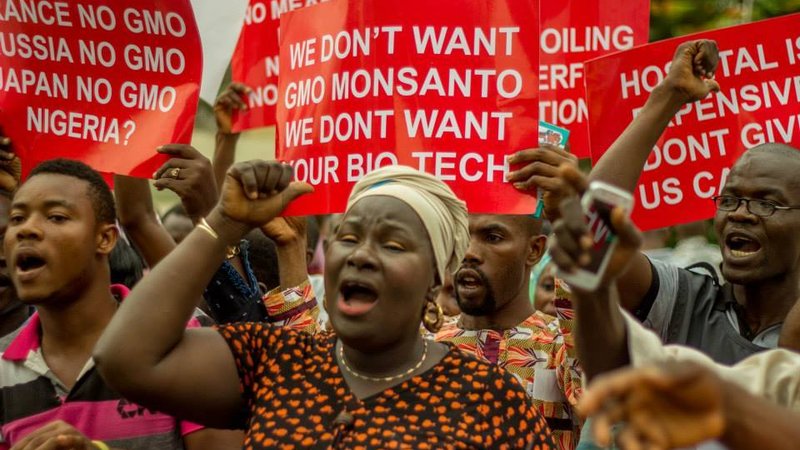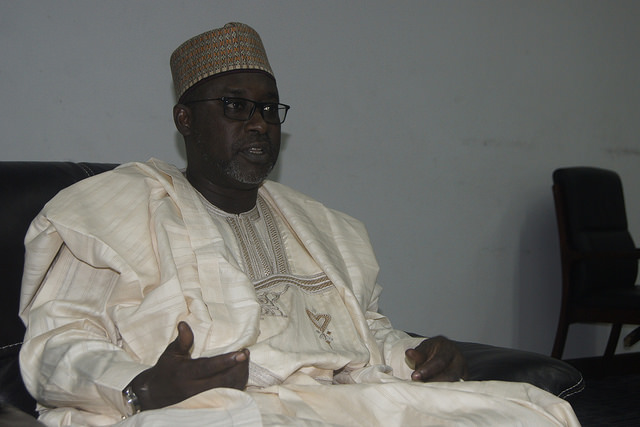
By Atayi Babs
Nigeria’s biosafety regulatory agency has began wide ranging analysis of suspected Genetically Modified (GM) products in the country. The Director-General of the National Biosafety Management Agency (NBMA), Dr Rufus Ebegba disclosed this today at a press briefing.
In line with the NBMA’s resolve to ensure the safety of Nigerians, Ebegba revealed that the agency’s scientists had selected products suspected to contain genetically modified ingredients from some superstores in the country.
“The analysis followed a three-month GMO survey conducted by the agency which, among other findings, showed the presence of products containing genetically modified ingredients in superstores across the country” Ebegba said.
According to him, “some of the products have labels showing ingredients contained therein while others do not. Hence, the need to carry out an indepth analysis to ascertain the true type of genetic materials and their make-up, and to ensure that it is safe for Nigerians to consume.’’
In a separate interview, Miss Amedu Josephine, Head of the GMO Analysis Laboratory said: “We do have some foods on our shelves that are GM Foods. Our work is to ensure that it is actually GMO and to find out the genetic component that describes the GM material. We also have to be sure that the sequence that has been inserted is not one that will be detrimental to the health of Nigerians.”
“This is why we want to be sure that everything that is genetically modified within the borders of Nigeria is safe for public consumption,” Miss Amedu added
According to Amedu, the agency has been diligent in the discharge of its duties. “I urge Nigerians to have faith in the ability of the agency’s scientists to protect and safeguard their health,” she said.
It may be recalled that the agency acquired a state-of-the-art GMO analysis laboratory in 2016 as part of its resolve to diligently carry out testing of products.
Jury still out on GMOs in Nigeria
In the face of the acquisition of state-of-the-art GMO analysis facilities and assurances by the regulatory agency, a cross section of the Nigerian civil society are still up in arms against in the introduction of GMOs in the country.
At a stakeholders meeting on Promoting Biosafety in Nigeria held recently in Benin City, South-South Nigeria, the stakeholders led by by the Health of Mother Earth Foundation (HOMEF) and the Nigerian Bar Association (Edo State chapter) analysed critical issues and concerns of Nigerians on GMOs and the Nigerian Biosafety Management Act of 2015 which, according to them, did not take into account the concerns of local farmers and critical stakeholders, contrary to the provisions of the African Union’s Model Law on Biosafety and the Cartagena Protocol.
On this count, the stakeholders unanimously agreed that the Act in its current form lacks the legal safeguards to protect Nigerians’s food culture, environment, ecosystems and human health.
The non-state actors also expressed dismay over the Biosafety Agency’s refusal to take into account, the objections and critical concerns submitted by key NGOs supported by over 100 groups, bordering on health, environmental, socio-economic, technical and administrative concerns before issuing permits to Monsanto Agriculture Nigeria Limited on behalf of Monsanto Company, based in St-Louis, Missouri, USA, for commercial release and placing on market of genetically modified cotton and for the confined field trial of two maize events.
Wondering why institutions that are created to protect the Nigerian environment and biosafety are actually hand-in-gloves with corporations that are trying to flood the country with exotic and risky products and merchandise, Nnimmo Bassey of the Health of Mother Earth Foundation called for a local and national paradigm-shift towards food sovereignty based on local contextual considerations, promotion of small-scale farmers, pastoralists and fisher-folk which have defined indigenous agriculture based on human rights and sustainable natural resource use.
“The mythical benefits of GMOs have ben debunked by many experts. For instance a report issued by over 400 scientists and development practitioners from developed and developing countries, under the International Assessment of Agricultural Science and Technology for Development (IAASTD), concluded that small scale farmers should be supported as modern biotechnology would have very limited contribution to the feeding of the world in the foreseeable future” Bassey says.
Chairman of the Benin branch of the Nigerian Bar Association, Barr Ede Asenoguan declared that there are several fault-lines in the permissive NBMA Act requiring that the entire Act be urgently reviewed and the GMO permits issued withdrawn. According to the Benin-based Lawyer, “the constitution of the Board of NBMA makes the agency open to conflict of interests as already seen in the case of a board member (National Bioetechnology Development Agency) teaming up with commercial interests to apply for and receive permits to introduce GMOs into Nigeria.”
Barr Chima Williams, President of the Green Alliance of Nigeria is of the view that promoters of GMO and their allies have deliberately ignored the importance and the peculiarities of Nigerian culture, environment and agriculture in their aggressive attempts to impose their products and merchandise on Nigeria . “Rather than promoting agroecology, which works in harmony with nature, they have become tied to the apron-strings of speculators and neo-colonial powers whose objective is to exploit, subjugate and destroy food production systems in Nigeria while promoting monoculture and use of toxic agro-chemicals” Williams added.
At the end of the meeting, the stakeholders called for concerted actions aimed at tackling the inadequate level of information and awareness on food sovereignty issues in the media which shuts out critical stakeholders, deepening public ignorance and inhibiting contributions to solutions.
For now, the relationship between the biosafety regulatory agency and the civil society groups in Nigeria remains largely that of a cat and mouse and the possibility of finding a common ground appears elusive.












